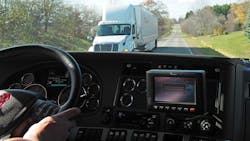Why some big names aren't on the FMCSA-approved ELD list
With about a year and a half left before most U.S. trucks will need to have some sort of electronic logging device, or ELD, just five vendors have added their products the Federal Motor Carrier Safety Administration's list of compliant devices. None yet are the big-name providers of electronic driver log recording instruments that conform to FMCSA's requirements in place for Automatic On-board Recording Devices, or AOBRDs, which are the current option to paper logs and a precursor to the mandated ELDs.
Complicating matters, trucking companies and some technology vendors have expressed concern about whether the self-certified products truly will be compliant with the ELD final rule's requirements, and Elise Chianelli, director of safety and compliance at fleet management technology company PeopleNet, spells out three things truckers should be aware of regarding where that process is now.
"In terms of the industry, I think it's going to be year's end or into next year before you really start to see a lot of credible names pop up" in the self-certified compliant ELD list, Chianelli says.
1. Certain FMCSA software/systems relating to ELD compliance aren't yet available.
If the Department of Transportation (DOT) shows up after the Dec. 18, 2017 ELD compliance deadline to audit a carrier's driver logs, either a driver will provide needed info to authorities at the roadside or the carrier will provide info from the back office to auditors. Chianelli says FMCSA will then take the information collected and run it through what the agency is calling its "ERODS," or Electronic Record of Duty Status, system to determine compliance with federal Hours of Service regulations.
"At this point, FMCSA has not yet released access to ERODS. There's been rumors we may not see that until the latter half of this year," she notes. "So in terms of being able to bring a compliant product to market, we're unsure how [an ELD provider] would know now that they are or are not compliant before they know that what they're showing for hours of service available matches what FMCSA shows for hours of service available."
2. Information required for one of the four ELD information transfer methods FMCSA specified also is not yet available.
FMCSA has outlined that ELDs will be able to transfer their data via web service, email, Bluetooth connectivity or USB 2.0 connection, Chianelli points out. However, for the "web services" transfer method, "FMCSA has not yet published where we would post the files to," she says. "The web services URL has not yet been provided."
"We at PeopleNet feel we will need to have access to these systems to ensure that when we release our ELD product, yes, it is indeed compliant with all the different specifications," she adds.
3. FMCSA has published a 400-plus-page document of ELD test cases that is optional for vendors to use in developing their ELD products.
In terms of what is available now, FMCSA published a 440-page document in late April containing ELD test cases and procedures, Chianelli notes. FMCSA states that "although use of the ELD test procedures set forth in this document is not binding on ELD providers . . . FMCSA would use these test procedures to evaluate compliance if the Agency decides to undertake an independent evaluation of an ELD that has been certified by the provider."
So in other words, "if there is an audit of your [ELD] solution, those test cases are what they (FMCSA) would use in order to determine compliance," says Chianelli. "FCMSA has stated that you can use the test cases they've provided to ensure your product is in compliance, but you don't have to.
"At the end of the day, this is definitely an area where we feel it's very important for carriers to do their research and due diligence before making that purchase decision," she continues. "They need to make sure they're partnering with the right people who understand the complexities involved" when it comes to ELDs.
Advice for now?
Again, Chianelli emphasizes that PeopleNet and many of the company's peers in the ELD provider community aren't likely to self-certify their ELD products until later this year or into 2017.
"And remember, that's when and if FMCSA grants access to these other applications or pieces of information that will be required," she notes.
While there are five companies to date that officially claim their products are compliant with the ELD final rule, Chianelli says FMCSA is expecting perhaps four or five times that many vendors ultimately will have products on the self-certified list.
To read Chianelli's recommendations for how carriers can manage the ELD transition, see the complete story on FleetOwner.com.
About the Author
Aaron Marsh
Aaron Marsh is a former senior editor of FleetOwner, who wrote for the publication from 2015 to 2019.
